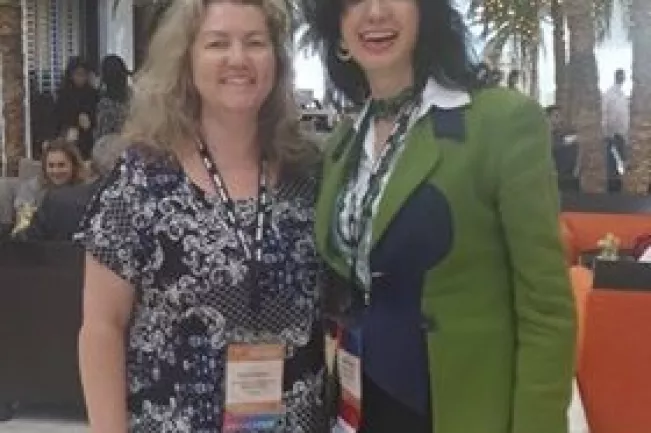Sprachenzentrum
Intercultural Communication projects with China, Dubai and Jordan
Eileen Küpper, who teaches Intercultural Communication (for both staff and students) at Bonn-Rhein-Sieg University states: “ No matter if the students work in a small local company or a large international firm, these are the skills they will need in their future workplace and which unfortunately are often not provided among their core subjects during their studies. What better way than to integrate it into their curriculum.

In order to do this Eileen Küpper has set up a student-driven international ICT (Information Communication Technology) collaborative exchange in the Intercultural Communication classes conducted by her and the lecturer Beate Roggenbuck in the Department of Management Sciences in Rheinbach. These projects have been successfully running for over three years and recently Eileen Küpper was asked to attend the TESOL (Teaching English to Speakers of Other Languages) Arabia conference in Dubai to present on her research on International ICT-based collaborative projects. Her project partners are Eva Haddad at the German Jordanian University in Jordan, Xu Jun at the Hunan University in China and Suhair Al Alami at the Al Ghurair University in Dubai United Arab Emirates.
As Eileen Küpper says: “Another motivation to set up these projects is the fact that there are many undeniable benefits of international student mobility; however, few students actually profit from 'real' mobility due to linguistic, financial and time constraints. A cheaper and easier alternative is ‘virtual’ mobility; the use of ICT to enable students to communicate and collaborate across borders of time and distance.”
The project is run between a pair or group of students from Jordan/China/ Dubai/Germany who create a piece of collaborative work, of their choice, throughout the project period of ten to twelve weeks. At the end of the semester the students not only present their final project but on a meta-level also analyse the whole project process, the successes and challenges, what they have learnt about time and project management, use of English as a medium for working collaboratively, adaption to communication style and working habits as well as the dismantling of stereotypes.
In a detailed project feedback sheet and focus group discussions held in China, Jordan and Rheinbach students have made the following comments about what they have gained from these projects:
- In exchange programs, and especially in this case, you learn much more than with a book or information from the Internet. It really is learning by doing.
- It gave me an authentic environment to improve my English skills through writing mails and messages as well as integrating theory and praxis together in a professional framework.
- It was very interesting to work with people from a different culture, because they used completely different methods to solve the tasks and exercises. I needed to adapt my expectations.
- It was a great experience to get to know someone’s culture and different traditions on such a personal and direct level.
- Although there are a lot of differences regarding our cultures there were also striking similarities that surprised me.
- It was a challenge to communicate with a stranger from a different country and to use different technologies but I have learnt a great deal about coping strategies and adapting to different working and communication styles as well as now being proficient in many different social and communication media :-)
- I now have a new friend in China and can’t wait to meet her when she comes to study in Germany next year.
Eileen Küpper: “These projects have been running successfully for several years and they give the students the chance to work on a virtual collaborative project for the first time. The students not only learn how to integrate theory with practice and experiment with different ICTs but they are also challenged to think ‘out of the box’ and learn to adapt to the differences in working and communication style. For several it is also the beginning of a new friendship as they continue to communicate once the project has finished.”
Eileen Küpper is hoping to extend this ICC model and its benefits into other programs in BRSU. If you are interested in integrating such a project (also on a smaller scale) into your course or degree programme, please contact her directly.